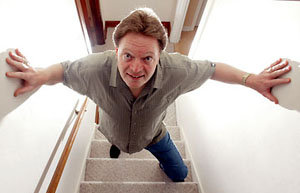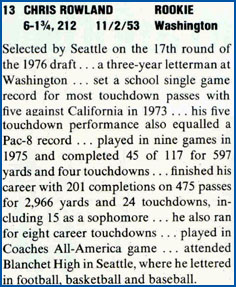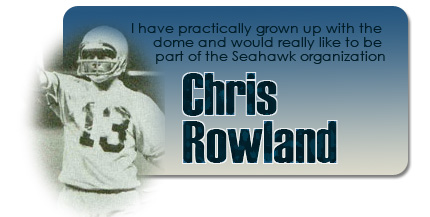Chris Rowland was there!

Smith 'A Pleasure to Watch'
Source: Seattle PI
By Don Fair
All five quarterbacks had their chance to run the offense during the 51-play scrimmage. Unfortunately, Chris Rowland, the ex-Husky, did not have, for him, a good showing.He was at the controls for 14 plays, completed two of eight passes for 24 yards, had one intercepted and was "sacked" (although no one was allowed to tackle the QB in the live session) twice.
Then came the other rookie, Steve Myer of New Mexico, who took the second unit on an 11-play, 60-yard drive into the end zone. Myer completed five of nine throws for 51 yards, and ex-Washington Slater Vaughn Williams ran the final seven for the score.
Veteran Neil Graff was four-for-six and 48 yards with one interception. He engineered a 50-yard TD march, capped by Alan Dixon's one-yard plunge.
The other veteran, Gary Keithley, also moved his club 50 yards for a score and the final play was a four-yard pitch to Smith, who neatly caught the ball off a defensive lineman deflect. Keithley was a hot six-for-eight and 93 yards.
Lefthander Jim Zorn finished it off, but failed to put any points on the board, which didn't bother Patera who said, "He did better than anybody in quickness. When the blocking breaks down, it looks as if Zorn can move."
Patera's other QB analyses: "Today was the first practice in which there was any difference between Myer and Rowland. Of course Rowland went first and faces much fresher defensive people. Myer and Keithley appeared to have things more under control than anybody."

Seahawks
by Doug Thiel
Sunrise Publishing Inc.
July 17, 1976: The temperature is in 90’s. There are now 78 players left in camp: 31 have been sent away. Chris Rowland of University of Washington didn’t make it. August 4th only 60 players will remain. The players know this but can only hope.
First Cut of Seahawks' Roster May Come Today
By Don Fair
P-I Sports Writer
After the morning workout and another skeleton (no rush) passing drill, QB coach Jerry Rhome said of ex-Washington quarterback Chris Rowland, "He is reading well and as a result is throwing to the right places. Of course there is no pressure."
In the afternoon scrimmage, Rowland threw only once with Ernie Richardson intercepting.

Where Are They Now: Chris Rowland
Former Huskies quarterback rose, sank amid program changes
Source: Seattle P-I
Wednesday, November 19, 2003
By DAN RALEY
SEATTLE POST-INTELLIGENCER REPORTER
He was tall, a hard thrower, confident, the classic Washington quarterback long before it became trendy. Trouble was, the Huskies didn't know it until it was practically too late.Chris Rowland seldom gets mentioned in the same breath as Steve Pelleur, Chris Chandler and Hugh Millen. Nor is he remotely linked to Cary Conklin, Billy Joe Hobert or the current guy, Cody Pickett.
Chris Rowland set five UW passing records but a broken ankle and a young Warren Moon blocked his climb.
Yet flip open the Huskies media book, and Rowland's name is still attached to five school passing records, plus the long-forgotten NCAA standard of 31 aerial attempts in one quarter.
Rowland had a star-crossed UW career, one interrupted by an untimely switch in offensive philosophy, admitted overzealousness by his coach, and finally a leadership change that made him an automatic casualty -- decisions that didn't favor him and overshadowed his accomplishments.
"Life has its twists and turns," he said. "I can't say I feel cheated. There were times I could have done a better job. I've got no remorse or guilt. I thought I played the best I could at the time."
Today, Rowland, 50, runs a Seattle-based seafood import company, primarily dealing with Russian and Asian interests. He and his wife, Kaye, have three soccer-playing daughters, Kyle, 15, Rachel, 13, and Olivia, 11. Adversity has not completely removed itself from the former quarterback's world, with his middle child recently suffering a collapsed lung and requiring surgery at Children's Hospital and Regional Medical Center.
Three decades ago, Rowland was a prized 6-foot-3, 220-pound recruit from Blanchet High School, choosing the UW over Washington State and Stanford, picking the Huskies because they had a dropback style in place built for Sonny Sixkiller and presumably for him.
As a sophomore in 1973, Rowland worked his way into the lineup for a bad team and showed what he was capable of doing, throwing five touchdown passes against Cal and four more in the Apple Cup against WSU. The Huskies lost both games, 54-49 and 52-26, respectively. Ineptitude had this 2-9 club surrounded.
"I got one of two game balls given out that season," Rowland recalled. "(Coach) Jim Owens' secretary misspelled Washington on the ball. She left off the 'G,' making it 'Washinton.' That summed up the year."
Shock greeted the passing whiz for his junior campaign. Owens switched to the run-minded veer offense, the growing rage around college football back then, particularly in Texas.
Rowland did the best he could with it until midseason. He broke his ankle against Oregon -- running an option play. He was taking snaps when he shouldn't have been, with the UW leading 52-0 before finishing off a 66-0 payback victory, his coaches dead set on avenging a crushing 58-0 defeat in Eugene the year before.
"I remember Jim Owens coming into my hospital room and he apologized with tears in his eyes," he said.
By the time he had recovered, Rowland had a new coach, Don James. He had a seat on the bench, too.
James brought in his own quarterback, Warren Moon. The coach was bent on making dramatic changes in '75, and Rowland was one of them. That didn't sit well with the senior.
"Not to take anything away from Warren, but I don't think he was ready," Rowland said, remembering a young Moon as a road roommate putting on his pajamas and saying his prayers before he went to bed. "James wanted to play as many young guys as he could to help recruiting. Players see that, and it's 'Where do I sign?'
"I think our team was sacrificed for the longer good of the program."
Yet after the Huskies stumbled to a 2-4 record, James replaced an ineffective Moon with Rowland. The UW won four of the five games the veteran started, beating UCLA and USC and losing by three to Cal.
Rowland's Huskies career did not have a storybook ending. For the Apple Cup, he came down with a virus, a combined hepatitis-mononucleosis strain, and played only the opening series before giving the team back to Moon. The Huskies pulled out a last-second 28-27 victory.
Through the years, Rowland primarily kept his distance from the UW football program. Last month, however, he attended his first homecoming game, one of only a handful of Huskies games he's sat through since graduating. He met with former teammates and Owens. He left at the end of the third quarter. He saw everyone, and that was enough.
He'd rather spend his time with his family, coordinating a men's homeless shelter, making his own decisions.
"Some guys like to relive the past," Rowland says, "but I'm not one of them."
Seattle Picks Ex-Husky Quarterback
POCATELLO, IDAHO
SUNDAY, APRIL 11, 1976
IDAHO STATE JOURNAL
SEATTLE (AP.) - The last pick in the Seattle Seahawks National Football League college draft Friday was, ironically former University of Washington quarterback Chris Rowland.
Rowland turned up in the 17th round "at the top when our turn came," said head coach Jack Patera. "We already had six other quarterbacks. We picked him because he was the one we wanted."
Seahawks personnel director Dick Mansperger denied drafting Rowland as a "public relations move."
"I'll guarantee you we didn't pick Chris for any goodwill thing," said Mansperger. "We don't operate that way."
He said the same holds for Dan Smith, a 16th-round draft choice and 257-pound tackle from Washington State University. Regardless of why he was chosen, Rowland was pleased. "There's no question I'm happy," he said. "I have practically grown up with the dome (the King County domed stadium) and would really like to be part of the Seahawk organization."
Perhaps the oddest selection in the Seahawks' college draft, which netted them 24 players, was Larry Shipp, described as a wide receiver, but actually a world-class hurdler from Louisiana State. He has run the high hurdles in 13.1 seconds, a tenth of a second off the world records, and he's the defending NCAA champion in that event But he hasn't played football since high school. "Our scouts say he has good hands, that he can catch the ball," said Patera. "Hurdlers are usually the tougher type of sprinters. It'll be hard for him to come back to football."
The only hitch is that Shipp, picked in the eighth round, wants to make the U.S. Olympic team, which could conflict with a football career.
Others selected on the second and last day of the draft included Bob Bos of Iowa State, linebacker Randy Coffield of Florida State, punter Keith Muehr of Southwestern Louisiana, wide receiver Ron Barnett of Texas-Arlington, running back Andy Reid of Georgia and defensive back Jarvis Blinks of Northwestern Louisiana, and Jeff Urcyzk of Georgia Tech.


